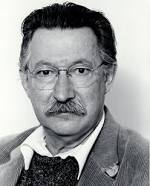Joseph Weizenbaum
 | Joseph Weizenbaum (8 January 1923 - 5 March 2008) was a German and American computer scientist and a professor emeritus at MIT. The Weizenbaum Award is named after him. His famed conversational computer program, Eliza, foreshadowed the potential of artificial intelligence, but he grew skeptical about the potential for technology to improve the human condition. |
Born in Berlin, Germany to Jewish parents, he escaped Nazi Germany in January 1936, emigrating with his family to the United States. He started studying mathematics in 1941 at Wayne University, in Detroit, Michigan. In 1942, he interrupted his studies to serve in the U.S. Army Air Corps as a meteorologist, having been turned down for cryptology work because of his "enemy alien" status. After the war, in 1946, he returned to Wayne, obtaining his B.S. in Mathematics in 1948, and his M.S. in 1950.
Around 1952, as a research assistant at Wayne, Weizenbaum worked on analog computers and helped create a digital computer. In 1956 he worked for General Electric on ERMA, a computer system that introduced the use of the magnetically encoded fonts imprinted on the bottom border of checks, allowing automated check processing via Magnetic Ink Character Recognition (MICR).
In 1964 he took a position at MIT. In 1966, he published a comparatively simple program called ELIZA, named after the ingenue in George Bernard Shaw's Pygmalion, which performed natural language processing. Driven by a script named DOCTOR, it was capable of engaging humans in a conversation which bore a striking resemblance to one with an empathic psychologist. Weizenbaum modeled its conversational style after Carl Rogers, who introduced the use of open-ended questions to encourage patients to communicate more effectively with therapists. The program applied pattern matching rules to statements to figure out its replies. (Programs like this are now called chatterbots.) It is considered the forerunner of thinking machines.
"It is not those of us who seek to understand the world from a number of different perspectives, including the scientific one, who prefer ignorance to knowledge. It is those who, blinded by their faith that science can yield 'full' explanations, prefer to remain ignorant of whatever knowledge other ways of knowing the world have to offer."
| Windows of Creation |
| Evidence from nature | Is the universe designed? |